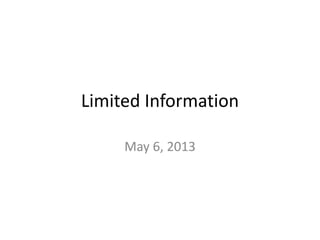
050613
- 1. Limited Information May 6, 2013
- 2. How was the exam? A. Easy B. Just Right C. Hard / Fair D. Too Hard / Not Fair
- 3. What was most useful? A. Practice exams B. Homework assignments C. Class notes D. Not one more than others
- 4. What was least useful? A. Practice exams B. Homework assignments C. Class notes D. Not one more than others
- 5. Announcements • TAs are still grading exams – We’ll let you know when they’re ready and how to see your score. • Two homework assignments now posted. – Ch 12 (material covered this week in class) due this Friday, May 10 – Ch 13 (material covered next week in class) due this Monday, May 13
- 6. Last Class • Finished our discussion of externalities • Key understanding: How efficiency can be restored when externality causes inefficiency • Restoring efficiency was also underlying motivation when studying – market power – games • Recall: ``efficiency’’ = perfect competition outcome
- 7. Perfectly competitive markets • Firms have no influence over what the going price in the market is. – ``Price-takers.’’ • Characteristic of perfectly competitive markets: – All firms sell the same (really the same!) product. – There are many buyers and sellers. – There are no costly barriers to starting a business. – Both consumers and firms are well-informed.
- 8. Perfectly competitive markets • Firms have no influence over what the going price in the market is. – ``Price-takers.’’ • Characteristic of perfectly competitive markets: – All firms sell the same (really the same!) product. – There are many buyers and sellers. – There are no costly barriers to starting a business. – Both consumers and firms are well-informed.
- 9. Learning Goals for Today • Be able to list many markets where consumers have limited information • Same for producers • Explain the sources of the free-rider problem in this context.
- 10. What is ``Incomplete Information?’’ • First, what is the worth of ``complete information’’ to the consumer? – Consumers can make rational decisions about marginal benefits (the demand line!) • How about to the producer? – Producers can make rational decisions about marginal costs (the supply line!)
- 11. How much are you willing to pay for a small cup of coffee? A. $0-0.50 B. $0.50-1 C. $1-1.50 D. $1.50-2 E. $2+
- 12. Here you go. A. $0-0.50 B. $0.50-1 C. $1-1.50 D. $1.50-2 E. $2+
- 13. Asymmetric Info How small is ``small?’’ Consider the opposite if you were a seller: how large is ``small’’?
- 14. Markets with Incomplete Information Consumers Producers Spend a minute and try to think of some / write some down.
- 15. In which consumer market is information most valuable? Consumers Producers
- 16. In which producer market is information most valuable? Consumers Producers
- 17. Lemons • Cars, or other consumer items, that have hidden problems are known as “lemons.’’ • Why is it hard to tell in the case of a car?
- 18. Your reservation price for a good used car is $5000. For a lemon is $1000. Given 20% of all cars are lemons, we can predict that • only lemons sell, for $1k each. • both types of cars sell, for $4200 each. • only good cars sell, fro $4200 each. • both reliable cars and lemons will sell for $1k each.
- 19. Expected Value • You can’t tell if a car is a lemon. • Therefore, your valuation is its expected value. • -> Should pay its expected value.
- 20. How much information?. Markets that people Markets that people research before buying. research until MB=MC.
- 21. Will the Market Provide the Optimal Level of Information? • In theory, information could be bought and sold just like any other good or service. • BUT because information can be easily transferred from one person to the next, it’s hard to keep people who don’t pay for information from benefitting from it. • Leads to a free-rider problem: any situation in which too little of a good or service is produced because you can’t exclude people who don’t pay for a good or service from benefitting from it.
- 22. Will the Market Provide the Optimal Level of Information? • People’s individual willingness to pay for information will be less than the social benefit of the information (since the information can costless be transferred to others). – Similar to the existence of a positive externality • Markets will provide too little information.
- 23. Will the Market Provide the Optimal Level of Information? • Example: go to Best Buy to learn about HDTVs, then buy online. – Best Buy covers the cost of the information it provides by charging a little more. – If no one willing to pay the extra for a TV from Best Buy, Best Buy will have a hard time providing good customer service.
- 25. Show-Rooming Rise of smart-phones has resulted in consumers going to individual stores, and then searching for same product online to find similar prices. What are some examples?
- 26. Show-Rooming Rise of smart-phones has resulted in consumers going to individual stores, and then searching for same product online to find similar prices. What is the ``story?’’
- 27. Show-Rooming Rise of smart-phones has resulted in consumers going to individual stores, and then searching for same product online to find similar prices. How do we think about it economically?